Return to KRAB Audio Archives main menu
The KRAB Audio Archive
KRAB has the Blues
King Biscuit Time with Bob West
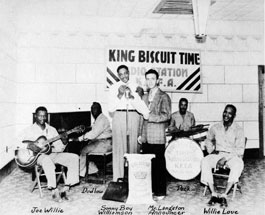
King Biscuit Time at KFFA
“Rhythm and Blues. Seattle collector Bob West takes over the R&B program with his extensive collection of LPs and 78s.” (Guide 107 February 22, 1967) During the first couple of years the program didn't have a consistent name. The typical description in the guide would be "Bob West and his giant collection of old scratchies." In 1970 he adopted "King Biscuit Time" in honor of the radio program heard over KFFA in Helena, Arkansas since 1941 (once sponsored by King Biscuit Flour).
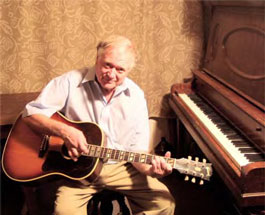
Bob West (Photo Jann McFarland)
In the 1960's and 70's, the Seattle Folklore Society, sometimes joined by KRAB, would sponsor concerts by a wide variety musicians. In December of 1967, they brought Booker (Bukka) White to Seattle, and he ended up at KRAB's doughnut shop studio with Mike Duffy, John Ullman, and Bob West interviewing.
The next year, Bob went to Memphis, to visit and record Bukka and his friend Furry Lewis. Over the next sixteen years Bob recorded many more interviews, with Pine Top Perkins, Big Joe Williams, Barbara Dane, Robert Pete Williams, Johnny Shines, Son House, Mance Lipscomb, Mississippi Fred McDowell, and others.
In the 1990's Bob started releasing his recordings on Arcola Records, from whom one can still purchase copies of his blues recordings of music and some interviews.
Remembering Bob West
August 2016 - John Ochs, a close friend of Bob as well as music enthuisiast and former KRAB volunteer program producer, wrote the following on the occasion of Bob's death.
Jay Robert (Bob, Jay) West ‒ longtime traditional jazz and blues musician, radio show host, and record producer ‒ died on July 31 of cancer. He was 74. Respected by musicians and collectors the world over for his field recordings and interviews, Bob was Seattle's premier archivist of country blues music.
Born in Seattle March 27, 1942, West moved to Chula Vista, CA for high school when his father took a job in the aircraft industry. Returning to Seattle after graduation, Bob became involved in radio when Lorenzo Milam asked him to host a country blues show on KRAB FM radio 107.7. The show, known as "King Biscuit Time," was named to honor a former Helena, Arkansas radio program which aired blues music in the 1940s.
West's parents collected records before he was born. His father, Frank, favored Harlem-style bands featuring Billie Holiday, Lester Young, Coleman Hawkins, Fletcher Henderson, and Earl Hines. Frank appreciated some blues players, but it was Bob's mother, Taimi, who really liked the blues. The prize of her collection was a mint copy of "Peetie Wheatstraw's Blues," a very rare record on the Bluebird label.
"I really started listening to the music when I was about 10, 11, or 12," he recalled. "I got so if I heard a record I never heard before I could tell it was Barney Bigard on clarinet, and I could distinguish Earl Hines from Jelly Roll Morton on piano, so it gave me the ability to really find these personal styles."
During the early 1960s, West was employed tensiling and braking metal parts in the Boeing laboratory's mechanical task department when fellow employee Leroy Johnson took him to see "a kid band" playing at a bar in West Seattle. The group, which called itself "the Great Excelsior Jazz Band" gave Bob his first chance to hear the tunes of Kid Ory and Kid Thomas played live in their original styles. Between sets, he met band members Ray Skjelbred and Mike Duffy, who introduced him to Bob and Sylvia Graf, local record collectors and jazz enthusiasts sitting in the next booth.
|
That evening proved to be a turning point in West's life, "It all fell together right there," he remembered. "Ray invited me down to the sessions at his houseboat, the one I'm living in now, which I bought from him in 1972. Bob Graf became a friend and mentor ... Later I played trombone with the Great Excelsior Jazz Band ... Then I started getting into the guitar and piano, playing the blues."
Duffy and Skjelbred hosted "Classic Jazz," a record show on KRAB. They asked West to play some blues records. KRAB-founder Milam listened and liked what he heard. "The next Monday, he asked if I'd like to have my own radio show, and that's how I got on the air, February 14, 1967.
"I got to play Fred McDowell records, Blind Willie McTell, Son House ‒ my favorites ‒ and it gave me a chance to play some old traditional, real rough, great, New Orleans bands that played blues, like the Kid Thomas band, and other styles of blues that just weren't being played. Jazz people, traditional jazz people, put their noses up in the air at the Creole style of playing. And I included one or two electric blues records, too. I tried to cover the whole thing without getting into popular music and soul music."
It was through his show that West first met the legendary blues guitarists whose music he later preserved on recordings. "The Seattle Folklore Society brought blues musicians into town, and KRAB worked to promote their shows ... We heard that Booker White was coming into town, and Duffy and I interviewed Booker on KRAB with Folklore Society president John Ullman. During the course of the interview, Furry Lewis' name came up. Booker said Furry was alive and well in Memphis."
A year later, West flew to Memphis where he spent five days living with Lewis. "Luckily, I had decent gear ... Lorenzo knew I had an Ampex 601 tape recorder, and he set everything up for me with a mike stand borrowed from Phil Williams and an RCA Model 77 microphone, one of the best mikes ever made, along with a little transformer in the line so it would be compatible with my Ampex."
It was a dangerous time for a white boy in Memphis. "This was a couple of months after Martin Luther King was assassinated," West said. "If I knew how bad things really were, I think I would have chickened out of it because all the buildings on Beale Street had been busted up, and plywood over all the windows ... Furry lived on the second floor of an old hotel on the corner of Fourth and Beale in the very historic area at the center of where all the old blues players had performed.
"I couldn't leave the house alone because Memphis was in such bad shape. Furry wouldn't let me do it. One night I tried to go over to Dewey Corley's house a block away, and 15 guys came up between two houses and tried to scare the wits out of me, and I went right back. So every time I went into Furry's house he had a big 2 × 4 he'd put up on the door, and he'd bring his pistol out in case the guys were going to try to come in."
On the trip, West recorded White, Lewis, and blues pianist Albino Red in Memphis, and guitarist Babe Stovall in New Orleans. When he returned to Seattle, he and Graf issued Furry Lewis and Bukka White at Home with Friends as a 12-inch LP on their Asp record label.
Over the years, West interviewed many artists as they passed through Seattle, including Johnny Shines, Pinetop Perkins, Fred McDowell, Mance Lipscomb, Son House, Sunnyland Slim, Big Joe Williams, Barbara Dane, and Robert Pete Williams. Often, Bob would cook up a week's supply of meals, stock the refrigerator, and vacate the houseboat so the musician would have a quiet place to stay during his engagement. White, Perkins, Sunnyland, Shines, and Pete Seeger enjoyed this brand of hospitality.
West worked at Boeing until the bottom fell out of the aircraft industry in the 1970s. With time on his hands, he increased his volunteer work for KRAB until he was hired as a program director, using his vacations for field trips to Louisiana in 1977, and St. Louis and Memphis in 1979. His recordings of Henry Townsend, Alvin Calhoun, Laura Dukes, and George and Bernadette McCoy from the latter trip, as well as others from the 1968 trip, were released on Arcola, the CD label he started in the 1990s.
After KRAB disbanded in 1984, West worked in quality control for the Stearns Co., a Boeing supplier. Known to fellow employees as "Jay," he remained in the aircraft industry until his retirement in 2007.
Bob lived in the houseboat on Wandesforde dock at Fairview Avenue for 47 years. Neighbors were accustomed to his late-night record-listening and jam sessions. His annual Fourth of July parties were memorable for their motley gatherings of musicians, radio volunteers, houseboat denizens, painters, glass-blowers, film buffs, and other interesting people who otherwise had no reason to mix.
West's thoughtfulness and generosity were legendary. A passing comment would lead later to an unsolicited gift of a book, a record, or a music- or video-tape or disc which often took hours to prepare. Even if he wasn't particularly interested himself, he kept an eye out for references to a topic in print or on TV if he knew someone who was. As a host or guest or to help a sick friend, he prepared special dishes, which he would either give to a departing visitor or deliver himself, as the situation dictated.
Bob's uncle, Tony West, was a midget-race-car driver in the 1930s, and Bob was as passionate about racing as music. Invariably, when he was not monitoring an educational show or an old movie, or recording programs and music for his friends, his television would be tuned to a car race.
Riding with West was a mini-lesson in race-car driving. Although careful to obey the rules of the road, he drove aggressively and was a stickler for taking the most efficient route to any destination. Once up to speed, he maintained a tachometer reading of at least 2500 rpms. "Most people don't know how to drive a stick shift," he'd say. "They go through the gears too quickly, and that's hard on the valves."
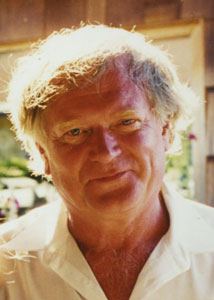 Bob was passionate about preserving the music of self-taught, agrarian-based musicians. He hoped their music might lead future musicians to learn their art in natural settings which would inspire more freedom and creativity than the formulaic pathway offered by today's popular culture and hide-bound systems of formal education. "I'm not a marketeer, and I am not concerned with business at all. I'd be tickled to death if I can communicate this material to 10 kids, and they carry it to the next generation.
Bob was passionate about preserving the music of self-taught, agrarian-based musicians. He hoped their music might lead future musicians to learn their art in natural settings which would inspire more freedom and creativity than the formulaic pathway offered by today's popular culture and hide-bound systems of formal education. "I'm not a marketeer, and I am not concerned with business at all. I'd be tickled to death if I can communicate this material to 10 kids, and they carry it to the next generation.
"... Why do we preserve our knowledge of being a blacksmith? I think everything beautiful that man has produced should be protected and saved. We may have to use it again. People I've talked to that work in ethnic studies at the University of Washington, why do they go to these countries and study music and dance? It's to find out how and why they live and maybe find out if we're missing something ‒ if we're forgetting about something."
In this regard, West walked the walk his entire life. Relying on records and his personal experience with the blues legends, Bob spurned formal instruction and taught himself to play the guitar, piano, trumpet, trombone, and the full gamut of "novelty" jug band and skiffle instruments. With fellow musicians, he could be stubborn and argumentative if they failed to adhere to the traditional style. Bands he formed were often short-lived, but always interesting. They included the Cornucopia Jazz Band, Peetie Wheatstraw and His Buddies, Mr. Cookie and the Crumbs, and the Acme Blues Band.
A lifelong humanitarian, West numbered the ACLU, Habitat for Humanity, Greenpeace, Public Citizen, KCTS Television, and the Smithsonian Institution among the organizations he supported.
West is survived by his sister Susan, of Seattle; his cousins Gary West and his wife Donna, of Seattle, and Matthew West and Michael West, both of Redmond; and his dear friend Rose Hedley, residing in Wales. A memorial is under consideration, but definite plans have not been made.
Note:
One can still purchase copies of Bob West's recordings of blues music and some interviews from Arcola Records.
And, we at the KRAB Archive are slowly working our way through his collection of reel-to-reel and cassette tapes.
Bob West interviewed by Clare Conrad
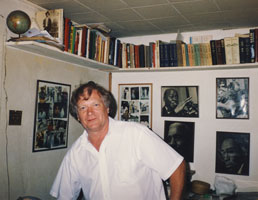 The tape box has no label or notes. But on the 7 inch reel inside was one of those yellow adhesive notes on which was written "Clare interview me".
The tape box has no label or notes. But on the 7 inch reel inside was one of those yellow adhesive notes on which was written "Clare interview me".
Clare Conrad, graphic artist, musician, former KRAB volunteer programmer, and friend, talks with Bob about his visits to Memphis, New Orleans, Furry, Booker, and even Boeing. On the same tape is about 10 minutes of Bob at his houseboat playing (foolin' around on), the piano and singing.
We do not know when either the interview or piano were recorded.
![]() Listen now - Bob West interviewed by Clare Conrad (61:16)
Listen now - Bob West interviewed by Clare Conrad (61:16)
Recording courtesy Bob West collection, BW1026; photo courtesy John Ochs and Jack Cook
Excerpts from King Biscuit Time on KRAB
The first King Biscuit Show was Feb 5, 1970, when the Dec 27, 1969 KRAB recording of Bob's interview/session with Big Joe Williams was broadcast. Prior to then, Bob's program on KRAB had simply been called "Rhythm and Blues" or "Blues West", the latter which Bob was not real excited about. In Jul 1970 it became, and stayed, King Biscuit Time.
In the early 1970's, while taking a break from working at KRAB, I listened at home, and sometimes recorded King Biscuit Time off the air. Assembled here are some excerpts from those recordings. The music is not identified in the krabplayer, but I have a list. A solid brass figlagee will be sent to any that can name more than 50%.
![]() Listen now - Blues from Bob West's King Biscuit Time
Listen now - Blues from Bob West's King Biscuit Time
Recording from creinsch
Booker (Bukka) Washington White at KRAB - KRAB Aug 30, 1967
BOOKER WHITE, Mississippi dobro blues guitar player talks with Bob West, Mike Duffy and John Ullman, blues freaks, and plays out his life in word and song. "It was like interviewing Mother Earth," said Duffy. (R)
![]() Listen now - Bukka White at KRAB (73:32)
Listen now - Bukka White at KRAB (73:32)
Recording courtesy Bob West collection, BW9012
Kid Thomas and Friends - KRAB 1968
This is kind of a puzzle. We do not have the tape labels, and have been unable to find a listing in a program guide that corresponds to the program content. But it is one of Bob "Kid" West's programs. There is no commentary on the first half, labelled "part 1", but Bob does talk about the music and one of his favorite musicians, Kid Thomas, in "part 2". And, toward the end, he announces that there will only be a couple more selections for those that are waiting for the next program. Ends abruptly.
![]() Listen now - Kid Thomas and Friends - KRAB 1968 (46:14)
Listen now - Kid Thomas and Friends - KRAB 1968 (46:14)
Recordings courtesy University of Maryland Special Collections and University Archives, collection of the National Federation of Community Broadcasters (NFCB) - umd-bcast-072052 and umd-bcast-072053
Eddie (Son) House interviewed by Bob West - Rec Mar 19, 1968, KRAB Apr 4, 1968
West Blues. How, when, where and why to get the best blues available. With comments on Belzona recordings and excerpts from Son House’s recent Seattle concert. With Bob West.
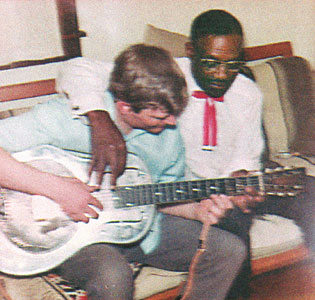
Bob West and Son House (John Ullman, photo)
Son House came to Seattle for Folklore Society concerts Mar 19, 1968 and again Nov 15 1969. On the 1968 occasion Bob West interviewed House. This recording comes from CD2 of the two CD set released by Arcola Records: "Son House in Seattle 1968". The notes indicate that Richard A. C. Green engineered the recording.

![]() Listen now - Son House interviewed by Bob West, 1968 (Arcola CD 1008) (46:14)
Listen now - Son House interviewed by Bob West, 1968 (Arcola CD 1008) (46:14)
Recording BW9008, Arcola CD by permission of Bob West; and BW0068 original tape of interview
Son House interviewed by Margaret Ellsworth - Rec Mar 1968 - Aired KING-FM May 5, 1968
Here we are wandering a little from KRAB, but this was found in Bob West's collection, and it was probably Bob that took Son House over to KING for the interview. Margaret Ellsworth was a staff announcer and programmer on KING. Among her duties was a folk music program.
Margaret also interviewed Furry Lewis, below.
This is recorded on the same tape as Bob's interview of Son House, which is presented directly above.
Recording courtesy Bob West Estate, BW0068
Furry Lewis Live at KRAB Studios - Rec May 20, 1968; KRAB Jun 10, 1968
The Great Furry Lewis Recorded Live at the KRAB studios. . . .Furry his wooden leg & his guitar came with Bukka White 3,000 miles by Greyhound bus to play for the first time on the west coast. . . .Furry and Bob West got together with a six pack of beer and they talk and Furry plays and we're going to save the tape forever 'cause it was really beautiful and we really fell in love with him and he can come back anytime and be on the board of directors.
Broadcast again Oct 14, 1971, with the following program notes:
Furry Lewis Interviewed at KRAB by Bob West on May 20. Since then, Furry has enjoyed the fruits of 'rediscovery,' many concerts and a number of recordings, the best one being a session with Bukka White in Memphis and released by Bob, Mike Duffy and Bob Graf on their fledgling ASP label. Although we have many West blues interviews, in the archives, we decided on this one for the Marathon because it hasn't been played since then and also because it may best typify the relaxed style Bob uses to transform a cold studio into a comfortable room in which to talk and play. A long-time KRAB volunteer, Bob West can be heard bi-weekly Sunday evenings on King Biscuit Time.
The program Bob put together was about an hour in length. We've had to cut the last 13 minutes off, because it developed some technical issues when it was transferred to a CD. If someone out there has a copy that doesn't have the jitters in those last 13 minutes, we would love to be able share it here.
![]() Listen now - Furry Lewis Live at KRAB Studios - Rec May 20, 1968; KRAB Jun 10, 1968 (45:10)
Listen now - Furry Lewis Live at KRAB Studios - Rec May 20, 1968; KRAB Jun 10, 1968 (45:10)
Recording courtesy Bob West collection, BW9018
Furry Lewis interviewed by Margaret Ellsworth - Rec May 1968 - Aired KING-FM Jul 7, 1968
Amongst the warhorses, KING-FM had several other programs of interest: In addition to his broadcasts from the Penthouse, Jim Wilkie also did a program of "third steam" jazz; there was a folk music show; and from the BBC, World Theatre and The Goons.
From her folk music program here is an interview of Furry Lewis by Margaret Ellsworth at KING-FM.
Ellsworth also interviewed Son House, above.
Recording courtesy Bob West Estate, BW1019
Mississippi Fred McDowell - Rec at KRAB Aug 9, 1969; KRAB Sep 13, 1969
Mississippi Fred McDowell - Taped August 9 in Seattle, playing his new electric guitar and Bob West's old National, drinking gin and answering questions. A Celestial Sound production.
"Celestial Sound" means Bob Friede engineered the recording session. Bob West told me he was not happy with this program, particularly Friede showing up with the gin, and everyone getting lubricated
![]() Listen now - Mississippi Fred McDowell and Bob West - KRAB Sep 13, 1969 (59:21)
Listen now - Mississippi Fred McDowell and Bob West - KRAB Sep 13, 1969 (59:21)
Edited down to one hour for the Sep 13 broadcast, some of the session was left on the cutting room floor, where we found it. Respecting Bob's edit, we did not put it back in, but are sharing it separately. A little more guitar tuning, and slowing it way down with Charley Patton.
![]() Listen now - Mississippi Fred McDowell and Bob West - out-take (10:07)
Listen now - Mississippi Fred McDowell and Bob West - out-take (10:07)
Somehow I was able to see McDowell at Vancouver’s Magic Theatre before he died July 3, 1972.
Recordings courtesy Bob West collection, BW1013; BW0134
King Biscuit Time, with Big Joe Williams - Rec at KRAB Dec 27, 1969; KRAB Feb 5, 1970
A special program, in which Bob West meets Big Joe Williams, who is heard on 9-string electric and 6-string acoustic guitar.
It is a little rough in the first minute as the microphone is repositioned, but after that Big Joe takes off, and Bob dances.
This session was recorded at KRAB's doughnut shop studios immedately following a Seattle Folklore Society Concert at the University Friends Center, which can now be heard here.
![]() Listen now - Big Joe Williams interviewed by Bob West (57:03)
Listen now - Big Joe Williams interviewed by Bob West (57:03)
Recording courtesy Bob West collection, BW9007
Mance Lipscomb talks and plays at KRAB - Rec Feb 1972; KRAB Mar 6, 1972
From Bob West's collection of interviews, here Bob and Chris Strachwitz (Arhoolie Records) talk with Texas blues guitarist and singer Mance Lipscomb at KRAB. Lipscomb died Jan 30, 1976.
![]() Listen now - Mance Lipscomb, Bob West and Chris Strachwitz - Rec Feb 1972; KRAB Mar 6, 1972 (56:42)
Listen now - Mance Lipscomb, Bob West and Chris Strachwitz - Rec Feb 1972; KRAB Mar 6, 1972 (56:42)
Recording courtesy Bob West collection, BW9009
An Excerpt from King Biscuit Time - KRAB Sep 24, 1972
KING BISCUIT TIME - Bob West with the blues is all it says in the guide. Bob tells us the program is running late so Ray Serebrin wont be on until 11:15pm. During Bob's announcement the transmitter blowers seem louder than usual.

![]() Listen now - an excerpt from King Biscuit Time with Bob West - KRAB Sep 24, 1972 (18:25)
Listen now - an excerpt from King Biscuit Time with Bob West - KRAB Sep 24, 1972 (18:25)
Recording courtesy Bob West collection, BW9009
An interview of Carl Martin, followed by Martin, Bogan and Armstrong in concert at the Seattle Folklore Society Clubhouse - KRAB Jun 27, 1975
Martin, Bogan, and Armstrong. The oldtime black string band visited Seattle in April. Originally from the South, but more recently living and playing out of Chicago, Carl Martin, Ted Bogan and Howard Armstronq were recorded at the Folklore Society Clubhouse by Phil Williams. Later, in the KRAB studios, Bob West interviewed Carl Martin about the early days, the music and the people he knew.
According to the program guide listing (above), in Apr 1975 Martin, Bogan and Armstrong were in Seattle for a performance at the Seattle Folklore Society Clubhouse where Phil Williams recorded them. Stop me if you've heard this before. I cannot find a date, graphic, or any other info about the concert. If you can, please let me know.
According to the tape box, the full program, interview plus SFS concert, is 96 minutes. We have only reel one of two, which is comprised of a 48 minute interview of Carl Martin by Bob West, followed by 23 minutes from the SFS concert. The second reel with the remaining 25 minutes is missing.
Recording courtesy Estate of Bob West, BW1011
"Pinetop" Perkins chats with Bob West and performs in the KRAB studio - KRAB May 3, 1982
Here's another of Bob West's interviews of blues musicians, this one with Pinetop Perkins, boogywoogy piano player. Although it was scheduled in a program guide for May 3, 1982, it would seem likely it was recorded in Apr of 1981 when Pinetop brought his Legendary Blues Band to the Rainbow.
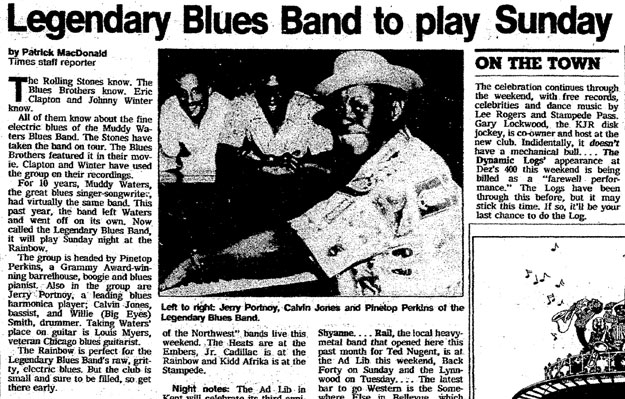
Patrick MacDonald in the Seattle Times, Apr 3, 1981
![]() Listen now - "Pinetop" Perkins talks with Bob West and performs at KRAB - May 3, 1982 (25:30)
Listen now - "Pinetop" Perkins talks with Bob West and performs at KRAB - May 3, 1982 (25:30)
Recording courtesy Bob West collection, BW9014
Bukka White and Furry Lewis in Memphis - Rec Jul 5, 1968; KRAB Oct 14, 1980
Recorded in Furry's Memphis living room in July 1968 by Bob West. [Guide 216, Jul 1971]
Furry Lewis had just been in Seattle and on KRAB in May 1968, and here, 2 months later, Bob is recording him and Bukka White in Memphis. At one point, about 36-1/2 minutes into part 1, Bob reads the program guide listing for Furry's show broadcast Jun 10, 1968. From the liner notes of ASP-1 (Furry Lewis and Bukka White - At Home With Friends), written by Mike Duffy, we learn that the friends at the Party included "Little Man, Red McNulty, Calvin Gill (The Home Town Boy), and a nameless old lady who was drawn in by the sound (and who listened, laughed, and finally fell asleep on Furry's bed."
This tape may be a dub of the original. It runs 92 minutes in total. Recorded in Memphis by Bob West, with recording supervision by Calvin Gill.
An edited 45 minute version was released on ASP-1, produced by Bob Graf and Bob West, edited by Bob Friede, and production assistance from Mike Duffy, Sylvia Graf, and George H Buck, Jr. In 2001 Bob released the first Arcola CD (1001) "Party! At Home", with additional material recorded on Jul 3rd and 6th, bringing the length up to 75 minutes.
 John Ochs writes about the Memphis visit above, and Bob talks about it during his interview with Clare, also above.
John Ochs writes about the Memphis visit above, and Bob talks about it during his interview with Clare, also above.
![]() Listen now - Bukka White and Furry Lewis in Memphis - Rec Jul 5, 1968; KRAB Oct 14, 1980 (93:02)
Listen now - Bukka White and Furry Lewis in Memphis - Rec Jul 5, 1968; KRAB Oct 14, 1980 (93:02)
Recording courtesy Bob West Estate, BW0059
Barrelhouse Chuck Calls Bob West From Chicago - Rec KRAB Jul 6, 1982
Here is a short interview via telephone of Barrelhouse Chuck Goering, shortly after moving to Chicago. It includes a bit of his piano playing.
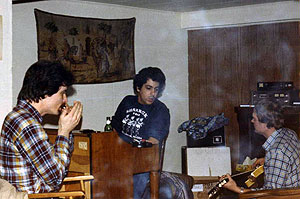
Left to right: Mike Lynch, Barrelhouse Chuck, Bob West, 1970s in Ketchikan(?)
Photo courtesy Mike Lynch - To see a larger version, click on tape label below, right.
In Blues Blast Magazine Jan 19, 2014, Terry Mullins writes "Chuck moved to Seattle (and started a band called Blue Lights), then on to Alaska (where he ran off with a club owner’s daughter!) and then, in 1982, made his way back to Chicago, this time to stay."
In a comment on the Bushdog Blues blog, Mike Lynch writes, "I haven't seen Barrelhouse Chuck since he played with the Seattle band Blue Lights in the late '70s. A great player and totally dedicated to the blues."
Barrelhouse Chuck died in Dec 2016. 
It takes Bob and Tiny about 15 seconds to get the phone bridge working . . . . .
![]() Listen now - Barrelhouse Chuck Calls Bob West From Chicago - KRAB Jul 6, 1982 (8:47)
Listen now - Barrelhouse Chuck Calls Bob West From Chicago - KRAB Jul 6, 1982 (8:47)
And, here's a link to a youtube posting of 25 Years of Barrelhouse Chicago Blues Piano, Vol 4, The Blue Lights Band Live
Recording courtesy Bob West Estate, BW1014
Barbara Dane talks with Bob West - Rec Jul 1983; KRAB 1983
Barbara Dane, in Seattle performing at Washington Hall and Rainy Town folk club, talks with Bob West about her music and Cuba. This seems to have been recorded in Jul of 1983.
![]() Listen now -
Barbara Dane talks with Bob West - 1983 (34:13)
Listen now -
Barbara Dane talks with Bob West - 1983 (34:13)
Recording courtesy Bob West collection, BW1031
If you possess any souvenirs (program guides, tapes, or photos) or have a story about your experience with KRAB you are willing to share, please email archive@krabarchive.com
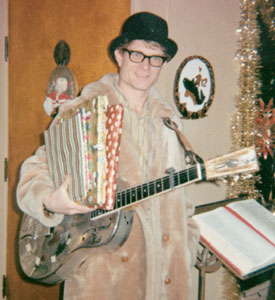

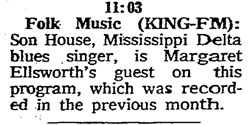 Seattle Times May 5, 1968
Seattle Times May 5, 1968